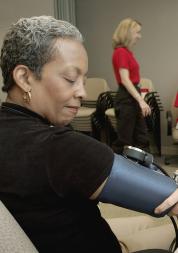Improving Community Nursing in the East of England

Background
NHS England has been developing the National Community Nursing Plan 2021-26, which sets out how the NHS can ensure the success of community nursing. One of the priority areas is to understand how community nursing is seen and valued by both the NHS and the public.
To understand what the public thinks about community nursing and the value of this service, NHS England commissioned local Healthwatch in the East of England to engage with patients, carers and families about their views towards community nursing and their experiences of using this service.
What we did
We worked with other local Healthwatch including: Essex, Cambridgeshire & Peterborough, Central Bedfordshire, Bedford Borough and Suffolk, to hold a series of focus groups - both online and in-person.
Participants included parents, carers, family members and friends who had either personally used community nursing, or supported a loved one who had accessed this service.
What we found
- Participants expressed their gratitude and appreciation for community nurses, with many sharing very positive experiences and emphasising the nurses' kindness and compassion.
- Although communication with community nurses was positive, participants had problems communicating with administration teams, noting their inefficiency and unresponsiveness. For some, this resulted in care being significantly delayed.
- Participants praised community nurses for accommodating and respecting different cultures, religions and ethnicities when delivering care.
- Some participants noted that information about community nursing could be more accessible, such as providing leaflets in a range of formats including Easy Read and multiple languages.
- Continuity of care was important to participants. However due to pressures on services and the way they were run, most patients ended up seeing a range of different nurses.
- Some participants didn't feel involved in decisions around their care and felt that the care they received was rushed. Though most recognised that this is probably because of high caseloads preventing community nurses from providing better quality care.
- Their greatest concern was the pressure on community nursing, with many feeling that the service is unsupported, short-staffed and working with unmanageable caseloads.
What happens next?
The report has been shared by NHS England at a national and regional level, with practical action already being taken in response. Examples include:
- Using the findings to inform the National Community Nursing Plan, with a focus on what the service is doing well and what could be improved.
- Sharing the report with Chief Nurses, Directors of Nursing and their Deputies across the East of England.
- Using the findings to inform regional work improving care for patients living with urinary catheters including improving out-of-hours support, improving communication pathways and patient information, as well as preventing crisis management.
- Using the report to support discussions around how community nursing is commissioned in the East of England.
Read the full report below
If you need this report in an alternative format, please contact us.

